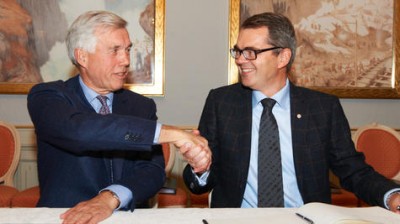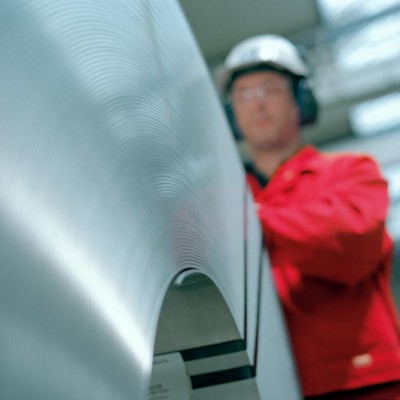This week’s sudden birth, in Oslo, of what’s being called the world’s biggest “aluminum solutions provider” was being hailed on Tuesday as everything from “visionary” to simply “a good deal,” for both companies involved and for Norway’s industrial base. The top executives of Norsk Hydro and Orkla, already two of Norway’s biggest companies, were literally left eating cake, served by the government minister for business and trade.

Stock analysts, government officials, labour unions and industrial advocates were all hailing the decision by Hydro and Orkla to merge their aluminum production divisions into a new company called Sapa. The new firm, jointly owned by Hydro and Orkla, will continue to produce items from aluminum cans to building materials, at a savings of as much as NOK 1 billion a year.
There were remarkably few concerns or critics of the deal, with even the head of Norway’s trade union federation LO applauding the merger. Powerful LO leader Roar Flåthen has been among those publicly scolding Orkla and its chairman, former retailing tycoon Stein Erik Hagen, for selling off its industrial Elkem unit to China National Bluestar last year and failing to prop up solar energy firm REC. Hagen’s drive to pull up Orkla’s industrial roots and concentrate on its brand-name food and household products business instead was viewed as undermining Norwegian industry and sending jobs overseas.

Now Hagen and his right-hand man Åge Korsvold suddenly seem like the darlings of both labour, business and political leaders for hammering out a deal with Hydro (in which the state has a major stake) that has enormous synergy, keeps the new merged firm’s headquarters in Norway and positions the now-struggling aluminum business for growth when the finance crisis eases overseas and demand returns for Sapa’s products. The chief executive of Orkla’s existing Sapa, Svein Tore Holsether, will continue as CEO of the new Sapa. Investors clearly approved of the deal as well, with the stock of both companies jumping after it was announced.
“We were skeptical (about Orkla’s strategy),” Flåthen conceded to newspaper Aftenposten on Tuesday. “It was in the cards that all the operations he (Hagen) wanted to sell would more or less go overseas. Now the story is different.”
Instead, Orkla’s aluminum business that’s already called Sapa will be spun off, along with its 13,000 employees, into the new joint venture with Hydro, forming a new Oslo-based company with revenues of around NOK 47 billion and 25,000 employees in 40 countries. The plan is to stocklist Sapa three years from now, but Hydro has an option to buy out Orkla’s share.
“This is pure and simple a good solution for both parts,” Eirik Vegen Dahle of Oslo securities firm Pareto told newspaper Dagens Næringsliv (DN). He was surprised by how quickly the deal came together and thinks prospects for its completion are good. There are some concerns over how competition authorities will view the deal, according to finance firm SEB Enskilda, but probably not enough to create any real hindrances to it.
Employees within the aluminum divisions of both firms face uncertainty over their jobs, with only 450 of Sapa’s employees located in Norway and “efficiencies” expected as the firms combine. Neither Hydro nor Orkla would comment on how many workers in and out of Norway will lose their jobs. The future for 400 workers at Hydro’s operations in Magnor and Raufoss was also unclear.
Otherwise the deal was applauded also by Trond Giske, government minister for trade and business from the Labour Party, which long has harshly criticized Hagen for his strategies and, not least, moves to lessen his tax burden. On Monday, Giske was all smiles, serving cake to both Hagen and Brandtzæg to celebrate the deal.
“This is a major event,” Giske claimed, adding that Sapa will be “number-one in the US and Europe and will have great possibilities in Asia,” pending all regulatory approvals. “But it’s the industrial thinking behind this that I warmly support.” He called it “visionary” and focused on the long term.
In the end, Orkla will be a brand-name consumer-products company after the stocklisting of forest products firm Borregaard as a biochemical business this week, and Hydro will still be Norway’s fourth-largest company in which the state has a stake, after Statoil, Telenor and Yara, itself a former unit of Hydro.
Views and News from Norway/Nina Berglund
Please support our news service. Readers in Norway can use our donor account. Our international readers can click on our “Donate” button:

